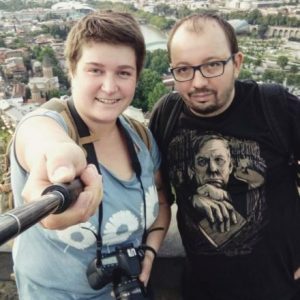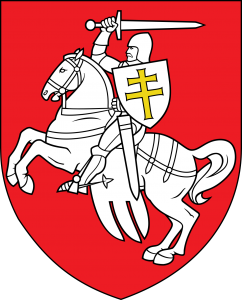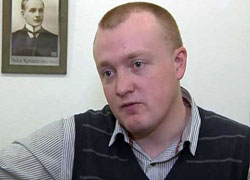21 Oct 2019 | Belarus, Belarus Incident Reports
[vc_row][vc_column][vc_column_text]
Index on Censorship’s Monitoring and Advocating for Media Freedom project tracks press freedom violations in five countries: Azerbaijan, Belarus, Russia, Turkey and Ukraine. Learn more.
[/vc_column_text][/vc_column][/vc_row][vc_row][vc_column][vc_row_inner][vc_column_inner][vc_custom_heading text=”5 Incidents” use_theme_fonts=”yes”][vc_column_text]
Public official sues Telegram blogger
26 September 2019 – The head of the Slonim district government Henadz Khomich sued Stiapan Putsila (better known by his pseudonym Stsiapan Sviatlou), the blogger behind NEXTA, one

Blogger Stsiapan Sviatlou is being sued by the head of Slonim district government
of Belarus’ most popular Telegram channels.
Khomich’s is suing Putsila for 50,000 roubles (nearly £20,000) worth of compensation for what he says is “moral damage” for a post that Putsila published in August 2019. In the post, Putsila said that Khomich had been detained for drunk driving and suggested that corruption was involved. Similar lawsuits have been filed against news websites belaruspartisan.by, 21.by, and bobruisk.ru, which republished the message.
Link(s): https://nn.by/?c=ar&i=238079&lang=ru
https://nn.by/?c=ar&i=238083
Category: Subpoena/Court Order/Lawsuits
Source(s) of violation: Known private individual(s)
Blogger receives threats
24 September 2019 – Blogger Andrei Pavuk from the town of Aktsiabrski in the Homel region received threats from an unknown person via Viber.
The messages were received on the eve of the court hearing of his lawsuit against the police aimed at receiving compensation for an unlawful search and detention, which Pavuk believes was done to intimidate him and to exert psychological pressure on him.
In March 2019, police raided Pavuk’s apartment, seized his professional equipment, handcuffed him and brought to the local department of the Investigative Committee for interrogation. The blogger was told he was held on suspicion of knowingly submitting a false danger warning to the authorities under under Art. 340 of the Criminal Code of the Republic of Belarus. Investigators alleged that the Ministry of Emergency Situations received a warning message from his email.
Link(s):https://euroradio.fm/ru/blogeru-andreyu-pauku-ugrozhayut-s-filippin-podumay-padla
https://baj.by/be/content/skazhy-dzyakuy-shto-nichoga-tabe-ne-padkinuli-blogeru-andreyu-pavuku-daslali-pagrozy-i
Category: Online Defamation/Discredit/Harassment/Verbal Abuse
Source(s) of violation: Unknown
Police filed report against Belsat TV journalists
19 September 2019 – Darya Chultsova, a Mahiliou-based freelance journalist, was summoned to Bialynichy District Police Department for questioning. Because she is not associated with an accredited news outlet, a police report was filed against her for illegally producing and distributing media content under Article 22.9 of the Code of Administrative Offences.
The police report stated that on 21 August 2019, Chultsova interviewed students’ parents at a high school. The next day, the interviews were allegedly shown on Belsat TV.
Link(s): https://baj.by/ru/content/posle-zatishya-vozobnovilos-presledovanie-zhurnalistov-za-sotrudnichestvo-s-belsatom
https://baj.by/be/content/sud-adpraviu-spravu-zhurnalistki-dari-chulcovay-na-dapracouku
Category: Arrest/Detention/Interrogation, Criminal Charges/Fines/Sentences, Subpoena/Court Order/Lawsuits
Source(s) of violation: Police/State security
Freelance journalist fined for working without accreditation
18 September 2019 – Freelance journalist Zmitser Mitskevich was fined by Pastavy District Court (Vitsebsk region) for contributing to Belsat TV. Because he is not associated with an accredited news outlet, he was charged with illegally producing and distributing media content under Art. 22.9 of the Code of Administrative Offences.
Link: https://baj.by/en/analytics/fines-journalists-violating-article-229-administrative-code-chart-updated
Category: Criminal Charge/Fines/Sentences
Source(s) of violation: Police/State security
Bloggers sued for covering environmental protests
17 September 2019 – Brest-based bloggers Siarhei Piatrukhin and Aliaksandr Kabanau learned that they are being sued for defamation by the lead-acid battery plant, I-Power, at the Brest Region Economic Court.
The lawsuit stems from the journalists’ interview with two environmental activists who claimed that contamination resulted from environmental violations committed by I-Power. The interview appeared on the YouTube channel Narodnyj Reportior.
It is not the first time that Kabanau and Piatrukhin have been sued by I-Power: in 2018, a judge ordered the bloggers to remove their YouTube video about the construction of I-Power’s battery plant and to publish an apology.
Link: https://baj.by/be/content/blogery-syargey-pyatruhin-i-alyaksandr-kabanau-raptouna-apynulisya-adkazchykami-u-sprave-ab
Category: Subpoena/Court Order/Lawsuits
Source(s) of violation: Known private individual(s)[/vc_column_text][/vc_column_inner][/vc_row_inner][/vc_column][/vc_row][vc_row][vc_column][vc_basic_grid post_type=”post” max_items=”4″ element_width=”6″ grid_id=”vc_gid:1571647405268-b77e79c5-1924-10″ taxonomies=”8996″][/vc_column][/vc_row]
18 Sep 2019 | Belarus, Monitoring and Advocating Coverage, News and features
On the surface, Belarus is one of the quieter places for journalists – one rarely hears about gruesome violations, physical assaults or murders of media workers in this post-Soviet country. But a lack of horror stories does not mean there is a liberal policy towards the media. In 2017, Belarus scored 83 points out of 100 (100 indicating the least free) in the Freedom of the Press rating compiled by Freedom House, and in 2018 it was ranked 153rd out of 180 countries in the World Press Freedom Index by Reporters Without Borders.
In a country where most media outlets are state-owned, one of the most common ways of interfering with journalism is the legislation banning foreign media workers and outlets from reporting without state accreditation – Article 22.9 of the Administrative Code. In 2018, the Belarusian Association of Journalists (BAJ) recorded 118 fines imposed on freelance journalists collaborating with foreign media without accreditation, totalling €43,000.
No outlet faced the consequences of this policy like Belsat TV.
Index on Censorship’s Monitoring and Advocating for Media Freedom project documents, analyses, and publicises threats, limitations and violations related to media freedom in Azerbaijan, Belarus, Russia, Turkey and Ukraine, in order to identify opportunities for advancing media freedom in these countries. The project collects, analyses and publicises limitations, threats and violations that affect journalists as they do their jobs. Its staff also advocate for greater press freedom in these countries and raises alerts at the international level. The project builds on Index on Censorship’s 4.5 years monitoring media freedom in 43 European countries, as part of Mapping Media Freedom platform.
The curious case of Belsat TV
 “In the spring of 2017, Belsat TV contributors have been repeatedly arrested, tried and heavily fined for covering the protests. The total amount of fines reached $9,000. In addition, our journalists spent more than 30 days in prison,” states the channel’s website.
“In the spring of 2017, Belsat TV contributors have been repeatedly arrested, tried and heavily fined for covering the protests. The total amount of fines reached $9,000. In addition, our journalists spent more than 30 days in prison,” states the channel’s website.
The tensions between the office of Belarusian President Alexander Lukashenko and the Poland-based, Belarus-centred Belsat TV date back to its founding in 2007. Lukashenko had called it a “stupid, uncongenial and unfriendly project” even before it launched. The independent media outlet is sponsored by the Polish government, and is owned by public broadcasting corporation Telewizja Polska.
As the channel’s website outlines: “Its original content is prepared by more than 100 associates from all over Belarus supported by around 80 editors, managers and technicians in Warsaw.”
The “associates” in question are independently-minded Belarusian journalists whose work is hindered by the restrictive state legislation. Belsat TV is not accredited or recognised in the country, and neither are any of its correspondents and stringers. The Belarusian Ministry of Foreign Affairs has repeatedly declined to accredit the outlet, prompting its journalists to do partisan work. The state punishes them with repeated fines, with no limit on how many times a single journalist can be punished.
“The definition of accreditation in Article 1(1) of the Law on Mass Media is as follows: ‘The confirmation of the right of a mass medium’s journalists to cover events organised by state bodies, political parties, other public associations, other legal persons as well as other events taking place in the territory of the Republic of Belarus and outside it’,” said BAJ law expert Volha Siakhovich.
In practice, she explains, the law blocks freelance journalists and independent media outlets from covering the activities of the government and makes accreditation a requisite for a career in journalism. Although refusing accreditation does not equal a total ban on a journalist’s professional activities, it creates obstacles for accessing information. This discriminatory structure is especially acute for freelance journalists and those who work for independent media outlets.
“Article 35(4) of the Law on Mass Media prohibits the activities of foreign journalists in Belarus without accreditation of the Foreign Ministry,” she said. “As Belarusian authorities are unable to control foreign media, they aim to control Belarusian citizens contributing to them. Their aim is to punish and intimidate in order to show that they are under their control at any given time.
“Under Article 22.9, the courts can rule that journalistic activity without accreditation equals ‘illegal production and/or distribution of media content’. The reason for prosecuting journalists for this offence is not the content of their work but that they were published through foreign media.”
And she added: “[When] freelancers are gathering information while filming or interviewing people, they can be detained and accused under Article 22.9. Police officers file reports against freelance journalists and send them to the court. In such cases, the usual evidence is the testimony of the police officers who detained the journalists, and of the people interviewed by the journalists. Then the judges sentence the accused to pay a fine. It’s not unusual if the fine exceeds an average monthly wage in the country [which is about €400].”
Case studies
Here are some of the incidents recorded by Index on Censorship between February and July 2019.

Ales Lyauchuk and Milana Kharytonava
On 31 May, a judge in the Maskouski district of Brest fined journalists Ales Lyauchuk and Milana Kharytonava for “illegal production and distribution of media content”. They were contributing to Belsat TV, covering the ongoing protests against the construction and launch of the iPower battery plant in the city. They were tried in absentia, and learned about the fines only upon returning from their holiday. They had to pay 1,020 Belarusian rubles each (about $1,000 in total).
This wasn’t the first time Lyauchuk and Kharytonava got fined this year. On 21 March, a judge fined them 2,250 Belarusian rubles (about $1,100). The pair had been repeatedly spotted covering protests against the same factory near Brest and interviewing local people, and the trial was based on reports filed by police.
“The materials of the case did not include information about the exact time of our being in the square, no names of people whom we had interviewed; there were no witnesses but, still, we have got a fine of 2,550 rubles,” Lyauchuk told his colleagues at Belsat TV.
On 18 April, the journalists were fined 1,275 Belarusian rubles (about $600) each, also for co-operating with Belsat TV without accreditation. The story they filmed was about the forgotten village of Veluyn, cut off from Brest by a lack of roads and public transportation.
In all, they were fined six times in 2018.
On 15 May, the trial of independent journalists Alena Shabunia and Viachaslau Lazarau took place in Navapolatsk. A judge found both journalists guilty of “illegal production and distribution of media content” under Article 22.9 and fined them 637.5 Belarusian rubles (over $300) each. The case was built around a video of an accident at the Polimir Navapolatsk plant that was broadcast on Belsat TV – the team interviewed worker Andrei Shvilpo, who saved his colleagues but was later convicted of causing harm to production.
Viktar Stukau, head of the Polatsk-Navapolatsk BAJ branch, told online outlet Charter27: “What these journalists did was the usual work of journalists. Moreover, according to our constitution, any person can create such materials, since everyone has a camera in a pocket, and can send them to social networks or to some mass media, Belarusian or foreign. How is it possible to prohibit this?”
On 30 April, Andrei Tolchyn, a Homel-based freelance journalist, was taken to court in connection with four unpaid fines. He was informed that his bank account had been frozen and he would have 10 days to pay the fines to regain access. The hefty fines for “illegal production of media content” came as a result of his unaccredited work for Belsat. The fines totalled 3,200 Belarusian rubles ($1,523). Tolchyn’s account was unblocked after he paid the fines but, in May, he filed a complaint with the UN Human Rights Committee.
Tolchyn used to work with Konstantin Zhukovsky, producing video stories and publishing them on YouTube. Their content was used by a variety of media outlets, including Belsat, so the courts applied Article 22.9 and the journalists were hit with mounting fines. As a result, Zhukovsky and his family left the country in January this year.
On 15 April, a freelance journalist from Hlybokaye, Zmitser Lupach, stood trial in the Sharkaushchyna district court for contributing to Belsat TV without accreditation. A judge imposed a fine of 892.5 Belarusian rubles (about $440) over a news story about the economic situation and low salaries in the district. This was the second time Lupach was fined in a month: on 11 April, the same court fined him 1,020 Belarusian rubles ($485).
He was tried under Article 22.9 (illegal production and/or distribution of media content) and Article 23.34 (violation of the procedure for organising or conducting mass events).
In the first case, the journalist was punished for his report aired on Belsat TV; in the second, for raising a white-red-white flag during Freedom Day, the anniversary of the Belarusian People’s Republic.
Lupach was also tried on 21 February for a story aired on Belsat TV about the monument erected in honour of the Komsomol in Hlybokaye. A judge fined him 892.5 Belarusian rubles (around $430). The previous year, Lupach was in court nine times on the same charges.
On 11 April, a judge in the Leninski district court of Mahiliou fined freelance journalist Alina Skrabunova 1,275 Belarusian rubles ($600). She was found guilty of “participation in the illegal production of media content”, as her video about the opening of an inclusive cafe operated by wheelchair-users had been broadcast on Belsat TV. The police documentation contained the wrong date for the alleged violation and a different charge. However, Skrabunova lost the case.
On 15 March, the Vitsebsk district court found journalist Vitaly Skryl guilty of illegal production and distribution of media content under Article 22.9. He was fined 637.5 Belarusian rubles (about $300) for his video on the closure of an enterprise which was broadcast on Belsat TV. Skryl told Radio Raciyja that he wasn’t surprised by the fine as he’d been fined on a similar charge the year before, for covering the unemployment situation in Orshy.
On 1 February, Ales Kirkevich and Ales Dzianisau were fined 765 Belarusian rubles (about $370) each in the Leninski district court of Hrodna. The charge followed their story titled Historians Exploring the Ancient Hrodna Cellars which was broadcast on Belsat TV. Both journalists were charged with Article 22.9 offences.
However, journalists collaborating with Belsat TV weren’t the only ones who got fined. Bloggers and freelance reporters whose work appeared in foreign or unaccredited media outlets met the same fate.
On 12 April, freelance journalist Yauhen Skrabets was fined 765 Belarusian rubles ($364) in Brest for “production of information content for a foreign media outlet that was not accredited in the Republic of Belarus”.
His article, entitled Activists and Independent Journalists Not Allowed Into the Press Conference at the I-Power Plant, had appeared on the website of Belarusian Radio Racyja, which is based in Poland. Like Belsat, the radio station had been previously denied accreditation by the Belarusian Ministry of Foreign Affairs.
Just a day before, the Leninski district court of Brest reviewed another case against the journalist on similar charges. The police report stated that he “interviewed without accreditation, thus violating the rights and obligations of a foreign media journalist”. As a result, a judge fined him 765 Belarusian rubles ($364). Skrabets insists that he never sent the article in question to Radio Racyja.
The judge assigned to the case, Aliaksandr Semianchuk, also handled the criminal case of the blogger Siarhei Piatrukhin, accused under Part 2 of Article 188 (“Slander”) and Part 2 of Article 189 (“Insult”) of the Criminal Code on 18 April. The criminal case was opened after a request by a police officer over a video on the blogger’s YouTube channel, Narodnyj Reportior, where people accused police officers of violence.
Piatrukhin was fined 9,180 Belarusian rubles ($4,590) and told to pay damages to the four police officers. The bill totalled $8,840, to be paid within a month, and the judge ordered him to pay the legal fees. The blogger also made a written undertaking not to leave the country, and his property was seized until his dues were paid.
But Piatrukhin remained defiant.
“I’m confident that if there wasn’t this case, there would be another one. They are demonstrating that, if they want, they would do anything,” he told Radio Svoboda. “To make me shut up they should at least shoot me. Whatever they do, they can’t hurt me any more. If they exile me, they’d make me a martyr, a star, draw attention to me. Look at how I live – I don’t have a car or anything. So they can go you-know-where with this fine and the compensation to the policemen. I’m not going to pay anything. Let them do whatever they want. Let them ban me from travelling abroad, I don’t care. This is my country, and I’ve never planned to leave it.”
Piatrukhin’s fundraising campaign, which he later launched on the MolaMola website in order to pay the fines, was suspended by the service provider on 5 May. It explained in a letter that “such activity could be seen as an attempt to evade criminal prosecution” and that it didn’t comply with the current Belarusian legislation. He was able to withdraw the money collected up until that date.
On 12 February, a judge in the Biaroza district court fined blogger Aliaksandr Kabanau 510 Belarusian rubles ($245) for failing to comply with the ruling of the Brest Economic Court. He was found guilty of damaging the reputation of a battery plant being built near Brest in his video published on YouTube. The court decided that Kabanau must remove the video – Lead Will End Up with Brest – from the platform, and publish an apology letter written on his behalf by the battery plant management. Kabanau refused to apologise, and the video has not been removed.
Andrei Bastunets, head of BAJ
The persecution of freelance journalists collaborating with foreign media began in 2014. This was not due to a change in legislation, but the police and the courts began to apply Article 22.9 in order to fine journalists for “illegal production and/or distribution of media products”.
The most difficult period was 2018, when the persecution intensified sharply. Before this, journalists of various foreign publications were fined. This year, it was only Belsat and Radio Rasyja.
Since the beginning of 2019, 38 fines have been imposed. The most recent penalty was on 31 May but, since then, the application of Article 22.9 has been suspended. Perhaps this is because Belarus is hosting the European Games and there are approaching elections. Usually, temporary “liberalisation” occurs before elections in the hope of a more favourable assessment by the international community. The degree of pressure on journalists is, in principle, determined by the political situation in the country.
By penalising freelance journalists for collaborating with foreign media, Belarus violates its international obligations – in particular, Article 19 of the International Covenant on Civil and Political Rights. The Belarusian Association of Journalists is in favour of lifting the ban on the activities of foreign journalists without accreditation.
Blocked Access
The second most common category of press freedom violation in Belarus this year is blocked access, as recorded by the Monitoring Media Freedom project. Cases range from denying accreditation for political events to journalists being detained prior to mass protests.
In Brest, blogger Aliaksandr Kabanau was detained by riot police in February as he left fellow blogger Siarhei Piatrukhin’s apartment.
The detention occurred just before the start of one of the weekly protests against the construction of a battery factory near Brest that have been taking place every Sunday for a year. Kabanau was released soon after the protest ended.
On 26 May, Piatrukhin was detained by Brest police on a flimsy pretext shortly before the start of an ecological protest. He was held for an hour.
On 9 July, police detained Belsat TV journalist Ihar Kuley and camera crew Syarhei Kavaliou and Maksim Harchanok, who were filming an episode of the programme Belsat Near You at the local market in Hantsavichy, in the Brest region. Officers told them to go to the police station, claiming they were not allowed to film there, and forced them to turn off their cameras. After the police got explanations, the journalists were released.
No journalists were allowed at the meeting held between Anatol Lis, the head of the Brest regional government, and environmental protesters on 12 June, despite the fact that three independent journalists had been included in the list of participants. Audio recording and photography during the meeting were banned.
The management of the iPower battery plant held a press conference on 11 June, but did not allow the majority of independent media representatives and bloggers regularly covering the protests and events connected with this plant to enter.
On 7 June, a Brestskaya Gazeta journalist was told she could not enter a new court building after its inauguration, citing her lack of accreditation.
The foreign ministry officer told Hrodna journalist Victar Parfionenka in a telephone conversation on 14 May that he had again been denied accreditation.
Parfionenka has been contributing to Radio Racyja for 10 years. Every year he appeals to the Belarusian Ministry of Foreign Affairs for accreditation as a foreign correspondent and always gets rejected.
On 18 April, journalists for news website TUT.BY,news agency BelaPAN, newspaper Belorusy I Rynok and European Radio for Belarus were denied accreditation to cover the annual address by Alexander Lukashenko to the National Assembly the following day. This was despite two of them – BelaPAN’s Tattyana Karavenkova and Zmitser Lukashuk, special correspondent for European Radio for Belarus – having permanent accreditation in the parliament.
Index on Censorship’s Monitoring and Advocating for Media Freedom project documents, analyses, and publicises threats, limitations and violations related to media freedom in Azerbaijan, Belarus, Russia, Turkey and Ukraine, in order to identify possible opportunities for advancing media freedom in these countries. The project collects, analyses and publicises limitations, threats and violations that affect journalists as they do their job, and advocates for greater press freedom in these countries and raises alerts at the international level. The project builds on Index on Censorship’s 4.5 years monitoring media freedom in 43 European countries, as part of Mapping Media Freedom platform.
11 Sep 2019 | Belarus, Belarus Incident Reports
[vc_row][vc_column][vc_column_text]
Index on Censorship’s Monitoring and Advocating for Media Freedom project tracks press freedom violations in five countries: Azerbaijan, Belarus, Russia, Turkey and Ukraine. Learn more.
[/vc_column_text][/vc_column][/vc_row][vc_row][vc_column][vc_row_inner][vc_column_inner][vc_custom_heading text=”4 Incidents” use_theme_fonts=”yes”][vc_column_text]
Journalist covering protests in Brest receives messages with threats
21 August 2019 – Journalist Nasta Zakharevich, who has been reporting on the construction of a controversial battery factory located in Brest, received insulting messages and a veiled threat from an account on VKontakte social network.
The VKontakte account is known for often leaving harsh and rude comments under posts authored by opponents of the plant. Earlier an individual with the same name and surname as the VKontakte profile that made the comments had filed a complaint with the police against ecological activist Dzmitry Bekalyuk, who is an opponent of the plant. The compliant accused accused Bekalyuk of “discrediting the Republic of Belarus.”
Link: https://charter97.link/en/news/2019/8/21/345601/
http://greenbelarus.info/articles/21-08-2019/zhurnalistka-kotoraya-pishet-pro-zavod-akb-v-breste-poluchila-soobshcheniya-s
Categories: Online Defamation/Discredit/Harassment/Verbal Abuse, Intimidation
Source(s) of violation: Known private individual(s)
State-run newspaper concealed opposition symbol on photo

Coat of arms associated with Belarusian opposition. It was previously the country’s coat of arms in 1918 and from 1991-1995. (Photo: Wikipedia)
15 August 2019 – Adzinstva, the local state-owned newspaper in Barysau, altered a photo published on its website of sports coach Viktar Zakharjeu to hide the previous state emblem of Belarus Pahonia, which is regarded by the authorities as an opposition symbol.
Pahonia was the official emblem of the Belarusian Democratic Republic in 1918 and of the Republic of Belarus from 1991 to 1995. It was abolished after Alexander Lukashenko became the country’s president, though it is not officially prohibited and is included on the Republic of Belarus’ cultural heritage list.
Links: https://baj.by/be/content/barysauskaya-rayonka-adzinstva-zamazala-pagonyu-na-svitshoce-geroya-intervyu
http://www.edinstvo.by/ru/news/obshchestvo/item/9153-borisovchanin-stal-pervym-trenerom-v-belarusi-po-krossfitu-v-invalidnoj-kolyaske?fbclid=IwAR3Z1yq6x92K-ZtxfF2DdNn1CY33vQVCCzVTwTZ95e6npWOzB2XDVsbCPh0
Category: Censorship
Source(s) of violation: Employer/Publisher/Colleague(s)
Regional government official refused to provide information on communicable disease
14 August 2019 – An official for the Brest regional government refused to provide information on a case of anthrax in the Stolin district to Aksana Brovach, a journalist working for the newspaper Komsomolskaya Pravda v Belarusi.
The official said that all the information was available from on the state-run news agency BelTA: “Can you read? How is it written there?”
The press-service of the Ministry of Agriculture and Food only published an official announcement about the anthrax case on the BelTA news agency.
Link: https://baj.by/be/content/usya-infarmacyya-na-belta-u-bresckim-ablvykankame-admovilisya-davac-kamentar-nakont-vypadku
Category: Blocked Access
Source(s) of violation: Government/State Agency/Public official(s)/Political party
After accusations, local independent news outlets investigated by police
13 August 2019 – Ivan Sukharevich, a resident of the town of Drahichyn in the Brest region, sent letters to the National Assembly of Belarus and to the news website Piershy Rehijon editor-in-chief Piotr Huzajeuski. In the letters, Sukharevich expressed his negative attitude to this online media outlet and particularly to its Drahichyn correspondent Siarhei Hardzijevich.
The writer warned of the serious consequences for the Piershy Rehijon if its journalists try “to shake up the community of our town and region” on the eve of the parliamentary elections and demanded to bring Hardzijevich to responsibility.
Accusations of lying are mentioned many times in the letter, but no evidence was provided for the accusations.
Sukharevich’s complaint was sent to the Drahichyn district police department to be investigated. Hardzijevich got a written response from the police that no evidence of illegal activity had been found.
Link: https://1reg.by/2019/08/13/drogichinskiy-pravdorub-pozhalovalsya-v-parlament-na-korrespondenta-pershaga-reg-yonu/
Categories: Offline Defamation/Discredit/Harassment/Verbal Abuse
Source(s) of violation: Known private individual(s)[/vc_column_text][/vc_column_inner][/vc_row_inner][/vc_column][/vc_row][vc_row][vc_column][vc_basic_grid post_type=”post” max_items=”4″ element_width=”6″ grid_id=”vc_gid:1567416168666-b6a972c4-0bc2-10″ taxonomies=”8996″][/vc_column][/vc_row]


 “In the spring of 2017, Belsat TV contributors have been repeatedly arrested, tried and heavily fined for covering the protests. The total amount of fines reached $9,000. In addition, our journalists spent more than 30 days in prison,” states the channel’s website.
“In the spring of 2017, Belsat TV contributors have been repeatedly arrested, tried and heavily fined for covering the protests. The total amount of fines reached $9,000. In addition, our journalists spent more than 30 days in prison,” states the channel’s website.

